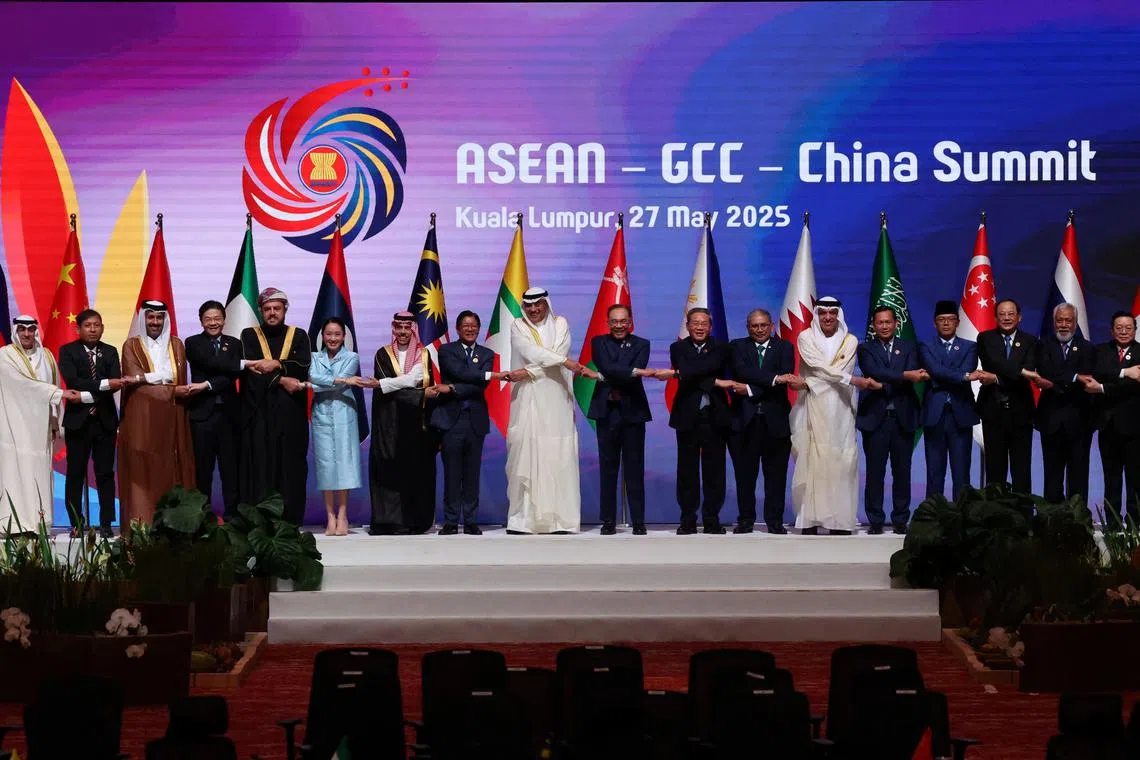Asean leaders meet China Premier Li and Gulf state dignitaries to bolster ties
Sign up now: Get ST's newsletters delivered to your inbox

Leaders of Asean, the Gulf Cooperation Council and Chinese Premier Li Qiang meeting for talks in Kuala Lumpur, on May 27.
PHOTO: REUTERS
Follow topic:
KUALA LUMPUR – South-east Asian leaders are looking to insulate their trade-dependent economies from geopolitical uncertainty, in particular US tariffs, as they hold talks with Chinese Premier Li Qiang and Gulf state dignitaries in Kuala Lumpur on May 27.
US President Donald Trump blew up global trade norms
Though he subsequently instigated a 90-day pause for most, the experience has spurred Asean to accelerate efforts to diversify its trading networks.
“A transition in the geopolitical order is underway,” Malaysian Prime Minister Anwar Ibrahim said on May 26.
After a lavish gala dinner the night before, May 27 sees the inaugural summit between Asean, China and the Gulf Cooperation Council (GCC) – a regional bloc made up of Bahrain, Kuwait, Oman, Qatar, Saudi Arabia and the United Arab Emirates.
Asean has traditionally served as “a middleman of sorts” between developed economies like the United States, and China, said Associate Professor Chong Ja Ian from the National University of Singapore.
With Washington looking unreliable these days, “Asean member states are looking to diversify”, he said.
“Facilitating exchanges between the Gulf and People’s Republic of China is one aspect of this diversification.”
Malaysia, which holds Asean’s rotating chairmanship and opened the bloc’s 46th summit on May 26, is the main force behind the initiative, Prof Chong said.
Opening the Asean-GCC meeting on May 27 – China will join later in the day – Mr Anwar said the two blocs had “the means and responsibility to rise as anchors of stability and engines for future growth”.
‘Timely and calculated’
Beijing, which has suffered the brunt of Trump’s tariffs, is also looking to shore up its other markets.
Its foreign ministry said on May 26 it “look(ed) forward to strengthening cooperation” with Asean and the GCC.
China and Asean are already each other’s largest trading partners, and Chinese exports to Thailand, Indonesia and Vietnam surged by double digits in April – attributed to a re-routing of US-bound goods.
Premier Li’s participation is “both timely and calculated”, Associate Professor Khoo Ying Hooi from the University of Malaya told AFP.
“China sees an opportunity here to reinforce its image as a reliable economic partner, especially in the face of Western decoupling efforts.”
Beijing and Washington engaged in an escalating flurry of tit-for-tat levies until a meeting in Switzerland
Chinese goods still face higher tariffs than most though.
According to a draft statement seen by AFP, Asean will express “deep concern... over the imposition of unilateral tariff measures”.
But it said earlier in 2025 it would not impose retaliatory duties.
Treacherous waters
Asean as a body has historically avoided choosing a side between the US and China.
China is only South-east Asia’s fourth-largest source of foreign direct investment, after the United States, Japan and the European Union, noted NUS’ Prof Chong.
Mr Anwar said on May 26 he had written to request an Asean-US summit in 2025, with his foreign minister saying Washington had not yet responded.
Yet any closer alignment with Beijing presents problems of its own, despite Datuk Seri Anwar’s insistence on May 26 night that “whatever is being said... we are here as a friend of China”.
On May 26, Philippines leader Ferdinand Marcos said there was an “urgent need” to adopt a legally binding code of conduct in the South China Sea.
Beijing has territorial disputes with five Asean member states in the area, with China and the Philippines having engaged in months of confrontations in the contested waters.
Mr Anwar raised the South China Sea with Mr Li, the Malaysian Prime Minister said in a May 27 Facebook post announcing the one-on-one meeting.
He also told Mr Li that Asean “appreciates China’s dedication to regional collaboration”, with most of the topics covered relating to trade.
“Other disputants... are perhaps willing to let the Philippines bear the brunt of pressure,” said Prof Chong.
Tension between Manila and Beijing “means that these issues will not fade into the background, much as some other South-east Asian states wish to focus on economic issues”, he added. AFP

